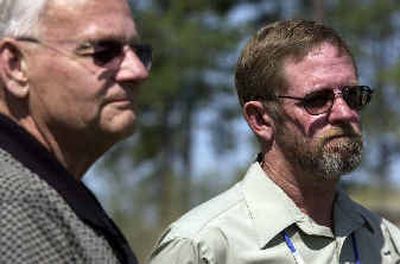Officials rip wastewater critics

Raw sewage is not what Post Falls plans to put on the Rathdrum Prairie and city officials are asking opponents to stop spreading “lies.”
Mayor Clay Larkin called an impromptu press conference Friday morning to condemn opponents for negative campaigning that has “degenerated into efforts of slander and outright lies.”
Larkin said Concerned Citizens of the Prairie also is violating state and federal campaign laws by not including attribution on ads and fliers, failing to provide information on who is donating money, and illegally stuffing mailboxes with information sheets without buying postage.
“People are being told that the city is going to spread raw sewage on this land,” Larkin said. “A granddaughter of one of my employees was told that her grandfather was going to poison the water. People are being told that the city is threatening to sue the opposition group to silence them. This is not true.”
Larkin said he fears that the misinformation and hype, caused mostly by county residents who can’t vote in Tuesday’s election, could harm the outcome.
Post Falls is asking voters to approve spending $9.5 million to buy up to 1,000 acres of farmland during the next 10 years for land application of treated wastewater. Residents’ sewer rates wouldn’t increase because the city would extend its current level of debt.
By irrigating crops with treated wastewater, the city could reduce the amount of effluent it dumps into the Spokane River. The effluent the city would use to irrigate the land is the same effluent that is currently discharged into the Spokane River, just upstream from several popular swimming holes. The solid sewage has been removed from the water and it has been treated with an ultraviolet process that kills most of the bugs and bacteria. Chlorine would be added to the water before it’s sprayed on the prairie.
Larkin said the water is clear, odorless and near drinking-water quality.
Connie Firkins, who leads the citizens group, apologized Friday for the campaign violations and said she is working with the city to make sure any new fliers are attributed to the group and that there are records of who donated money and volunteered services. She said the small group of residents aren’t politicians and aren’t familiar with all the laws.
Firkins said she isn’t opposed to the idea of land application, but is concerned, as are her neighbors, that the treated wastewater could contaminate their drinking wells near the proposed site south of Hayden Avenue between Chase and Greensferry roads.
“We are doing everything we can to get back into par with the law,” Firkins said, adding that the group never meant to break the law or spread inaccurate information. As soon as the election clerk notified Firkins Wednesday of the violations, Firkins contacted everyone in the group and told them to stop passing out fliers.
Yet Firkins said violations were reported after she called the halt. She thinks somebody in the group continued to pass out fliers and stuff them in mailboxes. Firkins said she doesn’t know who is doing it, but she wants them to stop because she doesn’t want to get fined.
Larkin said the city won’t pursue charges if the group corrects its campaign violations.
Firkins said she thinks her fliers and ads say nothing about raw sewage and it’s implied the wastewater is treated.
Yet one of the fliers states that the “sewage will be dumped 157 feet directly over the Post Falls/Rathdrum aquifer.”
A newspaper ad shows a toilet and reads, “Your City Council is proposing to buy unsuitable land for dumping human waste.” Later the ad refers to “treated effluent waste water.”
“We just don’t feel comfortable they are running the tests right,” Firkins said.
Both the Idaho Department of Environmental Quality and Panhandle Health District say that treated wastewater used as irrigation doesn’t harm the aquifer because the soil works as a natural filtering system. The plant roots absorb nutrients, such as phosphorus, before it can reach the aquifer.
The Kootenai Environmental Alliance, The Lands Council, the Upper Columbia River Group of the Sierra Club, and Rachael Paschal Osborn, a prominent public interest water lawyer, all have endorsed the city’s plan.
The city hired a local hydrologist to test the soil to make sure the Hayden Avenue site is suitable for irrigation. The tests showed that the land is appropriate for land application except in a few rocky spots that the city has said it won’t use.
The city requested the soil tests after the East Greenacres Irrigation District raised concerns that the farmland the city wants to buy is too rocky for irrigation and could contaminate the districts nearby wells.
“We are not monsters planning to poison our water supply,” Larkin said.
City Administrator Jim Hammond is appalled that someone in the citizens group was passing out water bottles with photocopied labels of “Werner Water,” referring to Post Falls Public Works Director Terry Werner, who manages the wastewater treatment plant.
The label reads, “An indiscreet, unskillfully blended mixture of waste water effluent from the illustrious Werner managed sewage plant.”
“It’s just mean and hurtful,” Hammond said.
Werner said the group is just pointing fingers and not listening to the facts.